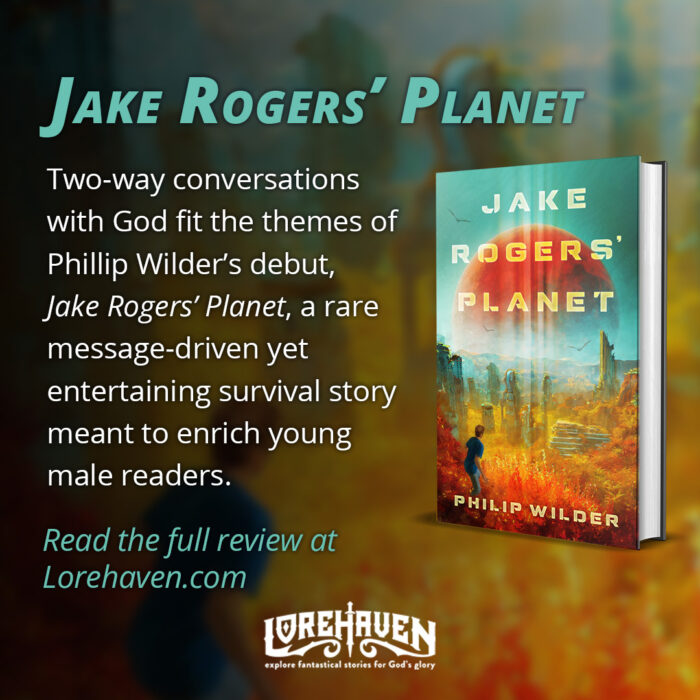How to Celebrate Christian Fiction Without Becoming Blind Supporters
Could we enter a new “golden age” for fantastical Christian fiction?
This question has featured in several Lorehaven podcast episodes over this past year, most notably episode 110, in which E. Stephen Burnett and Zackary Russell devoted to this question. While I’m hesitant to use the phrase “golden age” just yet, I favor the idea that we could at least be entering a “silver age.”
If you look at the fantastical Christian novels published over the past several years, you will see many admirable works, from Nadine Brandes’s Fawkes to Catherine Jones Payne’s Breakwater to Harper’s Silence the Siren to Kerry Nietz’s Amish Vampires in Space. To riff off Realm Makers’ old slogan, this isn’t your grandmother’s “corny Christian fiction.” Today’s Christian fantastical fiction often faithfully grapples with robust themes in entertaining ways.
Several key players have been making moves to grow this genre. Earlier this year, Oasis Family Media acquired Enclave Publishing, and now plans to release even more books and audiobooks. Realm Makers Bookstore has attended many homeschool conventions to bring these books to thousands of interested families.
This genre is growing—and this ought to generate excitement for more growth. Even enough to bring a potential “silver age” for fantastical Christian fiction.
But exciting developments can bring also old dangers.
The danger of blindly supporting stories
Many of us understandably desire to find stories that uphold our convictions. But when this desire meets the genre’s small size, we may adopt the misguided belief that we have a duty to support Christian stories regardless of their quality.
This belief takes different forms. You see it in claims that we need to see the latest big Christian film in theaters to send Hollywood a message about the market for these films. You see it in mindsets that automatically suspect secular works while readily trusting Christian works. Or in attitudes presented by reviewers who don’t have much to say about a story besides how many cuss words/sex scenes/violent encounters that story portrays. The underlying message? “Clean” Christian fiction gets automatic stamps of approval—regardless of quality.
This mindset is less popular today than in the 1990s and early 2000s. But this mindset still exists, and we need a way to celebrate excellent Christian fiction without blindly supporting anything that has the right labels. Philippians 4:8, after all, doesn’t just ask us to only consider “whatever is pure.” The verse also adds to that list “honesty,” “excellence,” and “loveliness.” Nor did God give Moses and Aaron permission to build the tabernacle however they wanted. He gave exact details and specifications so it could become a building of “glory and beauty.”
Christians are called to discernment—and not just in the moral realm. We ought to be voracious celebrators of the great Christian fiction out there. But we ought to do this celebrating with care and consideration for values we uphold.
That raises a question: by what standard?
Three unhelpful approaches of judging Christian fiction
Christian commenters offer us various standards for how to judge Christian stories with discernment. Not all these standards are based on God’s own standards. I suggest this includes one approach: expecting that good Christian stories should merely be “clean” or theologically accurate. God expected more than that from the tabernacle’s designers. And the example of Scripture itself certainly suggests God doesn’t have a bare-bones view of literary excellence.
A second approach, however, overemphasizes literary excellence. Certain literary critics set a rather high bar for this. If a writer hasn’t developed a story with the acumen of Flannery O’Connor, Jane Austen, Marilynne Robinson, or Fyodor Dostoevsky, such critics look down their noses. But this “highbrow” attitude misses the point that many of the classics studied today (such as Shakespeare and Dickens) were “lowbrow” popular works that only became seen as highbrow over time. This approach also forgets that Christ told simple stories that had few complex metaphors and heady subtext, but were delightful and meaningful.
Finally, a third approach simply focuses on a story’s entertainment value. This likewise falls short. Delight is a good quality in a story, but it’s too subjective of a standard to apply to a book. We all bring different experiences to a book that color how we read it. And too many delightful stories celebrate ugly or false claims.
Instead, I’d suggest that history provides us with a better standard to use.
Three better standards to discern Christian fiction
During my four years teaching English at a classical charter school, I helped students use a simple rubric for judging literary works.
This rubric could be summed up in three words drawn from the classical tradition: truth, goodness, and beauty.
- Does a story depict the world honestly—in a way that neither ignores evil nor portrays it with grimdark hopelessness? Does the story show a correct understanding of human nature and what it means for us to be Image-bearers?
- Does a story feature moral themes? Does it celebrate goodness and reveal the true consequences of evil? And do we as readers understand how to determine a story’s message even when it isn’t explicitly stated?
- Does the story use the gift of language in beautiful ways, using vivid words, emotional metaphors, and evocative prose to showcase the excellence of God’s creation?
These concepts give us profound simplicity and also profound depth.
Developing our discernment for Christian fiction
This short article provides little space to unpack these three concepts. That’s why, over the next months, I’ll write more Lorehaven articles that explore each concept and how we can use them to become discerning fans of excellent fiction.1
My goal in this exploration, however, isn’t to just look down at substandard works. Instead, I hope we can use our discernment to see and celebrate every aspect of excellence we see—while staying honest about the flaws of certain stories.
Discerning excellence takes more work than being a blind “support zombie.”2
But the reward is far greater.
- If you aren’t yet subscribed to Lorehaven, sign up to make sure you don’t miss them. ↩
- E. Stephen Burnett uses this phrase in Fantastical Truth episode 62. ↩





































As an avid reader of a variety of both secular and Christian fiction genres, I truly agree that we need to be more discerning when we read Christian fiction (or Christian-made fiction). I’ve also seen how difficult discernment can be for many believers. I think this article is a good start to helping the Christian fiction reader see where some so-called Christian books, unfortunately, don’t quite hit the mark.
And as a homeschool mom, I really appreciate the rubric for judging literary works that you shared. I look forward to your future articles that will explore these concepts more fully!
I love this, Josiah! Great points. I especially appreciate your scriptural support for quality work!
“Excellence in all things and all things for God’s glory” — the motto the church I used to attend embraced. The article is trying to emphasize it too.
Great article, premise and standards. The only unanswered I have is how would a Christian author know if he or she is achieving these standards? Where would one go to receive the proper feedback from discerning commentators for one’s existing books/stories? I really do like your standards and I truly do not mean to sound snarky, but outside of diving into your program, where would a current (and/or untrained) author obtain such feedback? Amazon is not trustworthy and social media can be biased (i.e. not necessarily honest).
On a positive note, I will likely return to read more great articles. Thank you.
For the writer side of things, we recommend Realm Makers. In fact, Josiah and I will both attend the conference this very weekend. See more about that event in today’s news post. Realm Makers also offers creator training in social networks and beyond.
Excellent and thoughtful article. We need to hone our critical thinking skills, balanced with childlike wonder and a desire for truth,